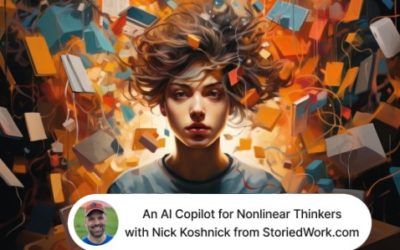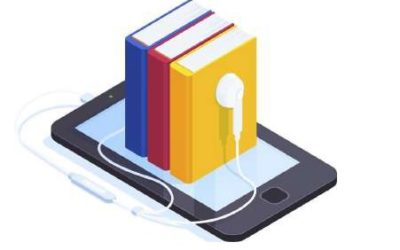ChatGPT is an AI or Artificial Intelligence-based program that can interact with you like a human in back-and-forth conversation. For dyslexic creatives, the potential to help with organization is immense. There are cautions about the technology, but also...
Nick Koshnick: StoriedWork.com An AI Co-Pilot for Non-Linear Thinkers
Nick Koshnick is a Stanford PhD and seasoned entrepreneur who raised money from companies like Google and Andreessen, and then sold the company.. He's also dyslexic. Now, he's co-founded StoriedWork.com with business partner Frank Corrigan. Storied has been nicknamed...
AI Voices Make Listening Easy
With AI, artificial voices for book reading are getting better. People who struggled with electronic voices in the past, may find themselves pleasantly surprised as AI-voices develop more natural voice pauses and even emotional tones that make listening more...
Reading Mode: How to Make Web Pages Easier to Read
Do you find it easier to read webpages that aren't cluttered? If so, you're not alone. Popups and even photos can be distracting. Many browser reading modes offer customizations like font size, color, and sometimes character and line spacing. Typically, many dyslexic...
Writing An Essay — How They Do It [Premium]
Over the past decade, it’s been a joy to see how many more dyslexic university students and professors are sharing how they tackle one of the most difficult tasks in education: writing an essay. The mechanics of writing are difficult, for sure, but for many, the volume of ideas and a need to organize and prioritize them is an equally difficult task. Here are two videos from Jemima Hutton, a medical student from Australia. She shares why she prefers mind-mapping to outlining (outlining is too restrictive) and how she enjoys getting her associated ideas down on paper. In the second video, Jemima talks about how she uses software to scaffold her writing. She uses Claro Writing Helper, but now there are other software similar to […]
Learning Outside the Lines [Premium]
Many adults with dyslexia only discovered that they were dyslexic late in life. Those who return to learning may enjoy more successes as they can choose routes of learning (and assessments) better matched to how they learn best. ONLINE LEARNING Many K-12 students may have disliked online learning based on pandemic experiences, but careful selection of online programs (some with 1:1 tutors) may result in better options than a particular classroom. If a student is failing, the school may be open to trying something different. The option to replay and re-listen, then have a tutor to follow up with additional explanations may be a way that some students can get through and succeed with math CERTIFICATIONS AND SCHOOL-TO-WORK PIPELINES The pandemic led to an explosion […]
Getting Your Phone to Read Your Screens and Books Without Audio Versions [Premium]
Maybe you know how to use your Siri or Google’s digital assistant, but do you know how to get all your screens including e-books read to you? For iPhones: Depending on your latest update, some of these settings may look a little different – but Accessibility from your General Settings should lead you to the right area. Some earlier version may just list “Speech”. You can choose to show the controller or hide it and also choose whether you would like text highlighted as it is spoken. The controller overlays any screen. Click on it to open. You can scroll horizontally on the button with numbers to increase or decrease speed. Other commands are listed on the page for Reading all content, speaking on touch. […]
Text-to-Speech is Getting Better [Premium]
If you haven’t been using text-to-speech lately, you’ll be in for quite a treat. Innovations in voice generation and cloning have made many free and premium (pay) voices better than ever. If you haven’t visited our Dyslexic Advantage online library lately (HERE), you may not know that we’re adding audio players to all our articles. After 160 issues (newsletter and premium combined), we have a tremendous library that we’ll be converting to playlists for those of you who prefer to listen. If you access the audio on our web pages, you can also adjust the speed. If you or your student had trouble with listening to text-to-speech in the past, you might want to retry text-to-speech apps or programs. They have improved dramatically and if […]
New Ways to Hack Learning [Premium]
Almost every structured literacy program uses letter tiles and flashcards. The reason for this is that there are so many word parts and whole words to learn and the use of tiles and cards can give students visual support as they focus on various letters, letter groups, and their sounds while building up reading fluency. Some students may have difficulty learning with tiles and cards if the lessons or demonstrations proceed too quickly, or if working memory is easily overloaded or motor challenges make hands-on activities more difficult than less kinesthetic ones. Activities like word sorts may also provide a little physical activity that help students stay alert and engaged whereas more passive study may have them drifting off. For college kids and adults, flashcards […]
The Power of the List [Premium]
For many of us, hearing about a new technology, app, or software can result in mixed feelings. We may have hope about better organizing and simplifying our lives, but also have reasonable worry about a difficult learning curve, a complicated interface, or any number of problems that can prevent us from reaping the benefits of whatever thing we are hoping might help. Enter – the simple list. If you have a weak short term or working memory, but great long-term memory and you don’t like reading lots of extra text, then lists may be the perfect productivity tool for you. Putting something down on a list can offload your working memory, but also have the benefits of reinforcing the big picture, while never losing sight […]
Readers Who Don’t Write
Brock and I were recently talking with our friend, Dr. Nicole Swedberg about how she came to focus in writing for dyslexic students when so many focus almost exclusively on helping students with reading. It was after finishing her advanced degree and training in...
Reading for Pleasure: Storyline Online & Learning Ally
If you're hoping to find ways to get your students reading independently for fun this summer, check out some of the wonderful resources available through Storyline Online and Learning Ally. STORYLINE ONLINE First, Storyline Online: It's a free resource where...

![Organization with Automation using ChatGPT [Premium]](https://www.dyslexicadvantage.org/wp-content/uploads/2024/03/Organization-with-Automation-Using-ChatGPT-400x250.jpg)



![Writing An Essay — How They Do It [Premium]](https://www.dyslexicadvantage.org/wp-content/uploads/2023/02/Writing-an-Essay-400x250.png)
![Learning Outside the Lines [Premium]](https://www.dyslexicadvantage.org/wp-content/uploads/2023/02/Learning-outside-the-lines-400x250.jpg)
![Getting Your Phone to Read Your Screens and Books Without Audio Versions [Premium]](https://www.dyslexicadvantage.org/wp-content/uploads/2023/02/Getting-Your-Phone-to-Read-Your-Screens-and-Books-Without-Audio-Versions-Dyslexic-Advantage-400x250.png)
![Text-to-Speech is Getting Better [Premium]](https://www.dyslexicadvantage.org/wp-content/uploads/2023/01/Phone-and-speech-bubbles-400x250.png)
![New Ways to Hack Learning [Premium]](https://www.dyslexicadvantage.org/wp-content/uploads/2023/01/New-Ways-to-Hack-Learning-Dyslexic-Advantage-1.png)
![The Power of the List [Premium]](https://www.dyslexicadvantage.org/wp-content/uploads/2022/12/Power-of-List-Dyslexic-Advantage.jpg)















